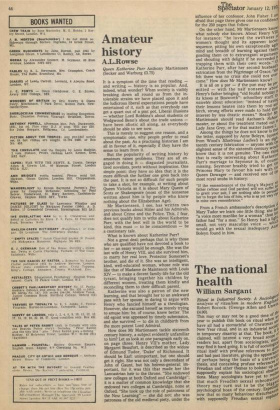Amateur history
A.L.Rowse
Queen Katherine Parr Anthony Martienssen (Secker and Warburg 0.75)
It is a symptom of the time that reading — and writing — history is so popular. And, indeed, what wonder? When society is visibly breaking down all round us from the intolerable strains we have placed upon it and the ludicrous liberal expectations people have entertained of it, such as that everybody can get a quart out of a pint pot. Liberal illusions — whether Lord Robbins's about students or Wedgwood Benn's about the trade unions — have been idiotic all along, as everybody should be able to see now.
This is merely to suggest one reason, and a symptomatic one, why people prefer to read about the past. As a practising historian I am all in favour of it, especially if they have the sense to learn from it.
But the popularity of writing history by amateurs raises problems. They are all engaged in doing it — disgusted journalists, tired novelists, poets without inspiration. One simple point: they have no idea that it is the more difficult the further one goes back into the past. It is not so difficult for such people to take a shot, for example, at writing about Queen Victoria as it is about Mary Queen of Scots or Shakespeare (most of the nonsense written about him is by people who know nothing about the Elizabethan Age).
Mr Martienssen, I see, has written two previous books about Hitler and his Admirals, and about Crime and the Police. This, I fear, does not qualify him to write about Katherine Parr; with the best will in the world to be kind, this must — to be conscientious — be a cautionary tale.
What is known about Katherine Parr?
Not a great deal; perhaps that is why those who are qualified have not devoted a book to her — an essay would be enough. She was the last wife of Henry VIII, and she survived him, to marry her real love, Protector Somerset's brother, and die of it. She was an intelligent, kind, well-educated woman, whose role was like that of Madame de Maintenon with Louis XIV — to make a decent family-life for the old tyrant, bringing together his children by different women, treating them kindly and reconciling them to their difficult parent.
Katherine was also a patron of the new learning, and that brought her to an awkward pass with her spouse, in daring to argue with Henry who fancied himself as a theologian. However, she excused herself ae; merely trying to amuse him: he, of course, knew better. The old egoist was appeased by timely submission, and she survived — to die in childbirth from the more potent Lord Admiral.
How does Mr Martienssen tackle sixteenth century history, a subject evidently unfamiliar to him? Let us look at one paragraph early on, on page three. Henry VII's mother, Lady. Margaret Beaufort, is described as the widow of Edmund Tudor, 'Duke' of Richmond. It should be Earl: unimportant, but one should get it right. She was not only a descendant of John of Gaunt, but his heiress-general: important, for it was this that made her the Lancastrian heir to the throne. "She endowed new colleges at both Oxford and Cambridge"; it is a matter of common knowledge that she endowed two colleges at Cambridge, none at Oxford. "She took up the role of patroness of the New Learning" — she did not: she was patroness of the old medieval piety, under the
influence of her confessor, John Fisher. I ars afraid that page three gives one no confidence for the 250 pages that follow.
On the other hand, Mr Martienssen knoWs what nobody else knows. About Henry VIII; for instance: "he loved the swiftness 0' women's thought and its apparent incoir sequence, pitting his own exceptionally agile mind and breadth of learning against theirs, goading them on to extravagant arguments, and shouting with delight if he succeeded 1 trapping them with their own words." ° Katherine Parr, after her second husband's extrication from the Pilgrimage of Grace, "she felt there was no crisis she could not over" come." How does Mr Martienssen know? It is all on a par — if the pun may be Per: mitted — with the naif nonsense abow Henry's father bringing "old feudal nobilitY t° its knees at Bosworth": schoolboy stuff. Or naivetes about education: "instead of havil their lessons beaten into them by rod an., birch, strong efforts were made to hold the!' interest by less drastic means." Really! Mt/ , Martienssen should read Ascham's Scho°,,, master, or about the treatment meted out Lady Jane Grey, or for that matter James r. Among the things he does not know is trild the letter, supposed by Anne Boleyn, (quot from Wood's Illustrious Ladies!) is an eigh: teenth century fabrication — anyone with Id' slightest sense of the sixteenth century Wu, know that it is not genuine. The one thIn that is really interesting about Katherin` Parr's marriage to Seymour is, of course; missing. Seymour brashly tried to get tile Princess Mary to favour his suit with Queen Dowager — and received one of til most royal snubs in history: "If the remembrance of the King's MajestY 1112; father (whose soul God pardon) will not suffer to grant your suit, I am nothing able to persuS her to forget the loss of him, who is as yet yerY Pr in mine own remembrance."
From a French ambassador's description ,1 Mary Tudor we learn one little thing: she na'; "a voice more manlike for a woman" than net, father had "for a man." So Henry had a lig,11,1, small, not very masculine voice — wh"e would go with the sexual inadequacy An" Boleyn found in him.


































 Previous page
Previous page